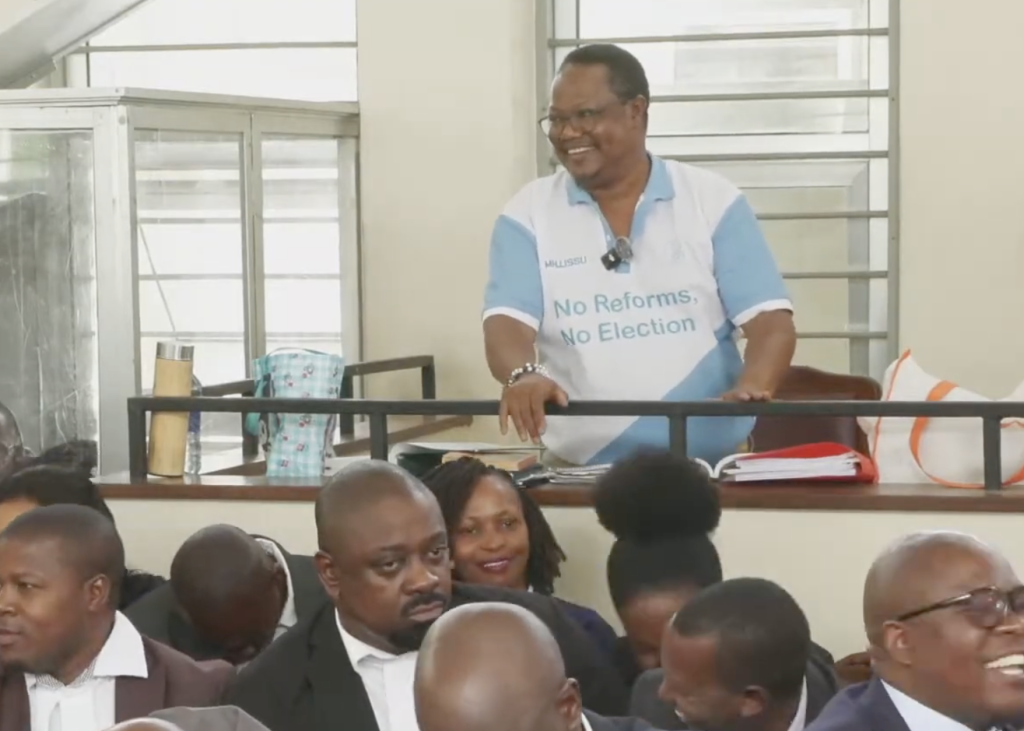Tundu Lissu now defends himself in a treason trial with Court approval of a self-representation request. The real reason, Tundu argues of serious violations of his rights under.policy custody, which his advocates may not be familiar with to represent him. Below is a capture of what is going on in a courtroom and my own viewpoint as an addendum:
⚖️ 1. Court Approval of Self-Defense Request.
Tanzanian opposition leader Tundu Lissu was granted permission by the Kisutu Resident Magistrate’s Court in Dar es Salaam to represent himself in his treason trial. Chief Magistrate Franco Kiswaga ruled that Lissu could engage directly with prosecutors unless he later chooses to appoint legal counsel. The prosecution, led by State Attorney Nassoro Katuga, raised no objections to this arrangement.
🔒 2. Reason: Denial of Legal Access.
Lissu’s decision stems from being denied confidential access to his lawyers during his 68-day detention. He revealed that prison authorities only permitted monitored phone conversations in a small room, raising concerns about eavesdropping or recording. Despite having over 30 trusted lawyers, he was prevented from private consultations, compelling him to take charge of his own defense.
⛓️ 3. Harsh Prison Conditions.
Lissu protested multiple violations of his rights during the hearing:
– Death Row Confinement:
He is held in a section reserved for inmates sentenced to death, despite being unconvicted.
– Surveillance:
Subjected to 24/7 monitoring by prison guards.
– Religious Freedom:
Denied the right to worship.
⏳ 4. Case Timeline and Charges.
– Arrest Date:
April 9, 2025, following a public speech demanding electoral reforms.
– Charges:
Treason (punishable by death) and publishing false information.
– Next Hearing:
.July 1, 2025, where prosecutors must present progress on investigations.
Table: Key Developments in Lissu’s Case.
| No. | Date | Event. |
| 1.0 | April 9, 2025. | Arrested after rally calling for electoral reforms. |
| 2.0 | June 16, 2025. | Court approves self-representation request; next hearing set for July 1. |
| 3.0 | 2017. | Survived assassination attempt (shot 16 times). |
🗳️ 5. Political Context: Elections and Repression.
The trial occurs amid a government crackdown on opposition ahead of Tanzania’s October 2025 elections. Lissu’s party, Chadema, was disqualified after refusing to sign an electoral code of conduct, citing bias favouring the ruling CCM party (in power since 1961). Chadema demands an independent electoral commission and legal reforms.
🌍 6. Domestic and International Reactions.
– Human Rights Groups:
Amnesty International calls for Lissu’s unconditional release, accusing President Samia Suluhu Hassan’s government of reverting to “repressive tactics“.
– International Solidarity:
Kenyan activists, including former Justice Minister Martha Karua, were deported in May 2025 when attempting to attend Lissu’s trial. They alleged torture and sexual abuse by Tanzanian authorities.
Table: Political and Human Rights Context.
| No. | Issue. | Detail. |
| 1.0 | Electoral Stance. | Chadema: “No Reforms, No Election” (slogan displayed on Lissu’s shirt in court). |
| 2.0 | Government Response. | CCM party has ruled Tanzania since iits ndependence in 1961. |
| 3.0 | Historical Context. | CCM party has ruled Tanzania since its independence in 1961. |
💡 7. Strategic Implications.
Lissu’s self-representation is a tactical move to:
– Highlight Judicial Bias:
Expose restricted legal access publicly.
– Mobilize Support:
Solidarity protests have erupted, with supporters wearing reform-themed apparel at court.
– Global Scrutiny:
Focus international attention on Tanzania’s democratic backsliding.
⏭️ Conclusion: A Pivotal Moment for Tanzania.
Democracy
Lissu’s trial transcends an individual legal battle—it tests Tanzania’s commitment to due process and free elections. The court’s allowance of self-representation acknowledges procedural flaws, yet Lissu’s treatment reflects systemic repression. With elections nearing, global bodies must pressure Tanzania to ensure fair trials and inclusive polls. The July 1 hearing will signal whether justice or politics prevails.
Why Defend himself?
Tundu Lissu’s decision to defend himself in his treason trial stems from “systemic denial of legal rights” and broader political circumstances. Here’s a breakdown of the key reasons, supported by multiple reports:
⚖️ 1. Denial of Confidential Legal Access.
– Lissu was “barred from private consultations” with his lawyers during his 68-day detention. Prison authorities only permitted monitored phone calls in a small room, raising concerns about eavesdropping or recording.
– He emphasized: “All the 68 days, they have not been allowed to see me or speak to me privately“. This obstruction left him no choice but to take charge of his own defence.
🚫 2. Harsh Detention Conditions.
– Death Row Confinement:
Despite being unconvicted, Lissu was held in a prison section reserved for inmates sentenced to death, intensifying psychological pressure l
– Surveillance and Restrictions:
He reported 24/7 monitoring by guards and denial of religious freedom, undermining his basic rights and ability to prepare a defence.
🗳️ 3. Political Repression and Electoral Context.
– His arrest followed a speech demanding electoral reforms ahead of Tanzania’s October 2025 elections. His party, Chadema, was disqualified from the polls after rejecting an electoral code it deemed biased toward the ruling CCM party.
– By wearing a shirt stating “No Reforms, No Election” in court, Lissu framed his self-representation as a protest against government repression.
🌍 4. Strategic and Symbolic Objectives.
– Public Exposure of Injustice:
Self-representation allows Lissu to directly voice grievances in court, spotlighting procedural violations and mobilizing domestic/international support.
– Defiance Against Authority:
Facing a potential death sentence, his move signals refusal to legitimize a trial he views as politically motivated.
⚖️ 5. Court’s Reluctant Endorsement.
– Chief Magistrate Franco Kiswaga approved Lissu’s request, acknowledging the impossibility of fair legal preparation under current conditions. The prosecution raised no objections, implicitly admitting procedural flaws.
💎 Conclusion.
Lissu’s self-defence is a direct response to “state-engineered isolation from legal counsel” and aims to transform the courtroom into a platform for challenging Tanzania’s democratic backsliding. As noted by a Kenyan activist:”This isn’t a trial; it’s political theatre“. His actions underscore a broader struggle for due process amid escalating pre-election repression.
Read more analysis by Rutashubanyuma Nestory

